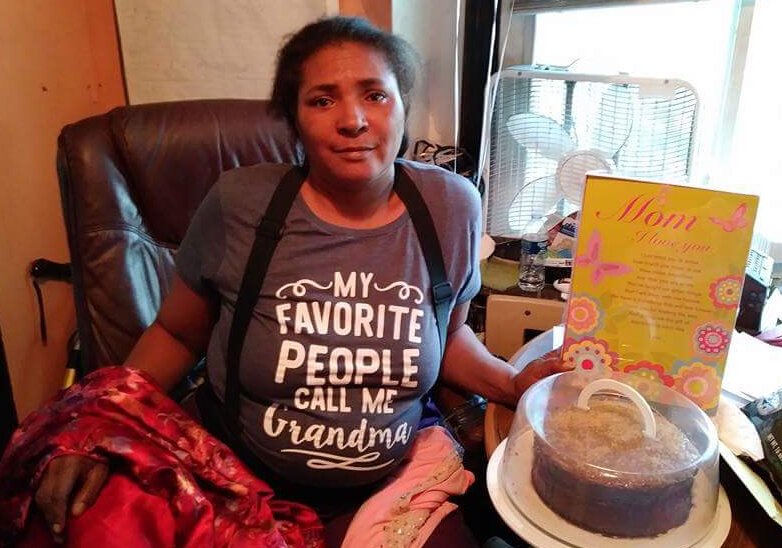Empowering community members to eat healthier
Sonia Brown, known as Auntie Na, is rehabbing a house to be much more than a food pantry to serve Detroit’s west side. Nutrition education around healthy food shopping, meal preparation, and growing vegetables will take place at the “nutrition home,” located in the beloved neighborhood known as Auntie Na’s Village.

Sonia Brown, aka Auntie Na, is executive director of Auntie Na’s Village, a nonprofit community organization on Detroit’s west side that provides meals, a community garden, emergency temporary housing, tutoring, and other services.
Auntie Na’s Village had to make some adjustments because of the pandemic in the past couple of years. Did some of those adjustments result in permanent changes?
We had a smaller food program prior to COVID and when COVID hit we collaborated with other organizations and nonprofits, putting out 20,000 to 40,000 pounds of food a week. So that geared us to increase our food program. I’m thankful because Kresge and Ford and Detroit Future City and others worked with us during COVID so that we were able to pivot into a project that was definitely more needed at that time than just my nutrition home could have serviced. It made a big difference. But right now, I’m focused on getting back to what the original agenda was—to put together a full, complete, sustainable program.
Now, we’re converting our pandemic food pantry into its own complete home—a nutrition hub, where we will have a kitchen banquet area and a food pantry. We’ll also be collaborating with nutritionists to help us in how to prepare the meals and put menus together as we offer up what’s in our food box program. We’ll be expanding our gardening program to incorporate more fresh vegetables not just suitable to one particular culture, but to serve many cultures, as we’ve noticed the diversity that is now taking place in our area.
Auntie Na’s Village recently received a Lowe’s Hometowns grant. How will you use that?
We’re rehabbing a home on the block, the nutrition home, and incorporating nutritional programs. One of those is a corner store program that’s allowing us to teach community members how to go into the corner store, where many tend to shop, and purchase more nutritious, healthy items. We’re also teaching people how to do their own little gardens, so that they will have—right there at their fingertips—their own sources of food and produce.
Why is teaching gardening important in this area of Detroit?
Our grocery stores have closed up. The two that we have, one told us that they no longer carry meat, and the other told us, due to skyrocketing prices, they’ve had to make their prices match those of their competitors, which places a lot of it out of the range for many of us in this area. Having stores in their own community, right up the street, is more conducive than having to go three to five miles to get to another grocery store.
How will the nutrition house also support food entrepreneurs in the community?
Being able to use the kitchen to do their own entrepreneurship will allow them and their families to benefit from the financial aspects, not paying for rental space and supplies, things like that. It will help them to build up their clientele and their businesses.
The nutrition house will also build individual as well as family wealth, community wealth, and generational wealth by giving it back where it belongs.
And all the nutrition programs are allowing my community, A) to become more knowledgeable, B) to learn how to eat healthier, and C) to allow them to take funds and put them back into the community—back into where they live and building from where they live.
You’ve purchased four houses in the neighborhood, so that each of them can provide its own services to the community. How is that going?
My medical clinic, which is also our warmth hub during the winter months, we’ve basically had to close down, unfortunately. We keep dealing with what we’ve found with many of our other community members—the basements keep backing up, and it’s damaging the furnace and hot water tank. To keep replacing furnaces and hot water tanks and having to redo my basement again and again is devastating. Right now, we’re struggling.
What are your volunteer needs?
I could definitely use volunteers, financial assistance, operational costs—for everything and anything. People who want to come and make themselves a part of something bigger than themselves, a place where they know they’re glad they came, because once you’re here, everybody knows who you are. And you can come and find your spot here. That’s what makes Auntie Na’s different—I don’t need the warehouse assembly line. I want those that want to shine and have fun with what they’re doing.
This entry is part of our Nonprofit Journal Project, an initiative inviting nonprofit leaders across Metro Detroit to contribute their thoughts via journal entries on how COVID-19, a heightened awareness of racial injustice and inequality, issues of climate change, and more are affecting their work–and how they are responding. This series is made possible with the generous support of our partners, the Michigan Nonprofit Association and Co.act Detroit.




